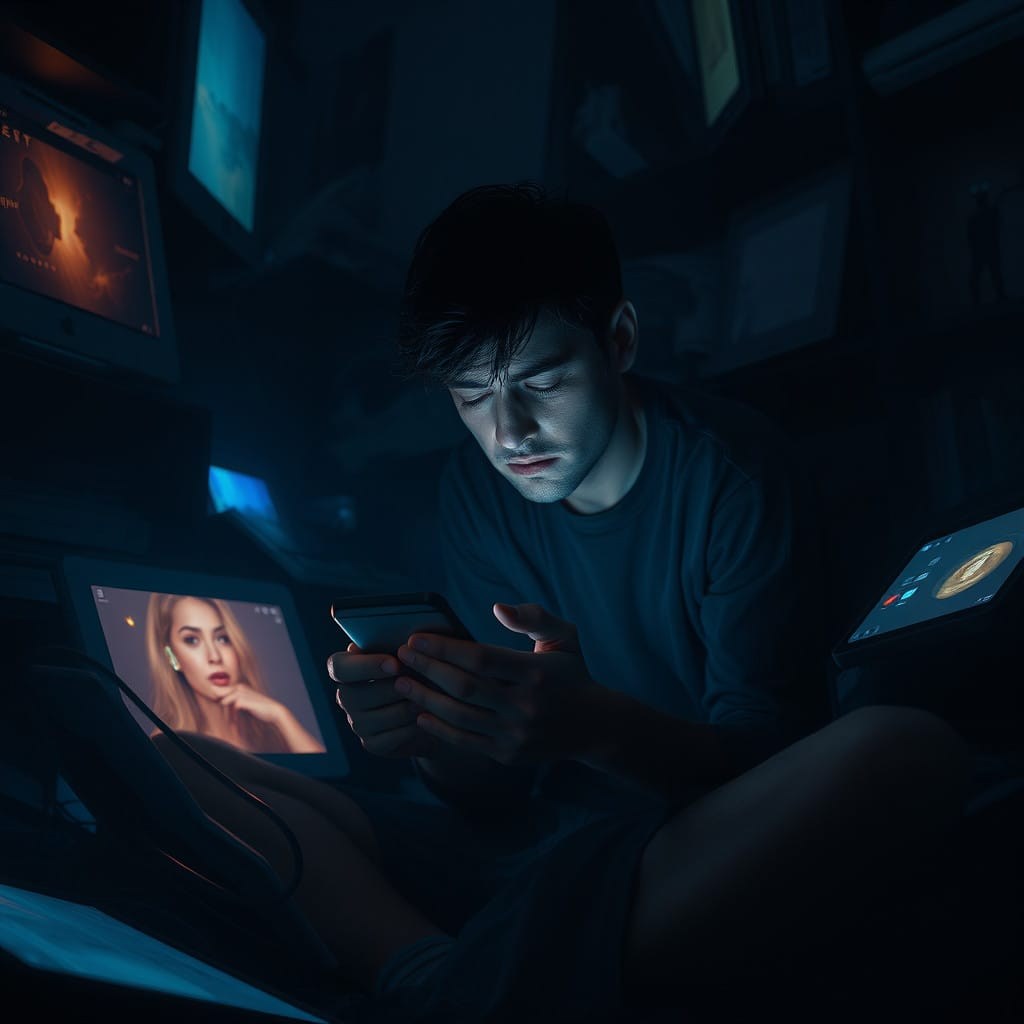The Song of the Phone
Richard

With fingers weary and worn,
And eyes heavy and red,
A person sits, all alone, forlorn,
A phone held tight in bed.
Swipe! Scroll! Swipe!
Through the newsfeed's endless flow,
And still, with a vacant stare, they type,
In the phone's pale, ghostly glow.
Tap, tap, tap,
On the glass, cold and bright,
'Til the sun outside starts to lap,
And shadows yield to light.
Oh! Men with sisters dear!
Oh! Men with mothers and wives!
Is it not their souls you should hold so near,
Not the screens that rule your lives!
Swipe! Scroll! Swipe!
Through curated, filtered scenes,
Where happiness is always ripe,
And life's a highlight reel, it seems.
Compare, contrast, despair,
In this digital, mirrored hall,
Is it joy that you find there?
Or the seeds of a bitter fall?
Tap, tap, tap,
In the silence of the room,
While the real world takes a nap,
And relationships wilt in the gloom.
Love letters left unread,
Conversations left unsaid,
For the phone calls, a siren's spread,
A connection to nowhere, instead.
Oh! But to breathe the air,
And to feel the sun's warm kiss,
To escape this digital snare,
And find true human bliss.
But the phone's grip is tight,
A constant, hungry need,
In the darkness of the night,
On its endless feed, they feed.
Swipe! Scroll! Swipe!
From dawn 'til day is done,
A life lived in a digital stripe,
A race that can't be won.
Tap, tap, tap,
Though their spirit starts to fray,
They're caught in the phone's cruel trap,
And they can't look away, can't look away.
With fingers weary and worn,
And eyes heavy and red,
A person sits, all alone, forlorn,
A phone held tight in bed.
Swipe! Scroll! Swipe!
In a world that's lost its way,
They've traded their soul, swipe by swipe,
For a screen's cold, empty sway.
Richard's The Song of the Phone
A Modern Lament in the Shadow of Industrialization
The Song of the Phone serves as a poignant reflection of our contemporary digital age, echoing the anxieties and societal critiques found in Thomas Hood's 19th-century poem, "The Song of the Shirt." While Hood's work lamented the dehumanizing conditions of industrial labor, this poem turns its attention to the insidious nature of technology and its potential to alienate individuals from themselves and their surroundings. Through skillful use of repetition, imagery, and allusion, "The Song of the Phone" constructs a powerful critique of our dependence on technology and its impact on human connection.
One of the most striking elements of the poem is its repetitive structure, mirroring the monotonous and addictive nature of phone usage. The recurring phrases "Swipe! Scroll! Swipe!" and "Tap, tap, tap" mimic the repetitive physical actions associated with smartphone interaction, emphasizing the cyclical and potentially compulsive nature of this behavior. This repetition also serves to underscore the poem's central theme: the individual's entrapment within the digital world. Just as the seamstress in Hood's poem is confined to her repetitive labor, the individual in "The Song of the Phone" is trapped in a cycle of endless scrolling and tapping, unable to break free from the screen's allure.
The poem's imagery further enhances this sense of entrapment and isolation. The individual is depicted as "alone, forlorn," their world reduced to the "pale, ghostly glow" of the phone. This imagery creates a stark contrast between the vibrant world outside and the isolating confines of the digital realm. The phone becomes a barrier, separating the individual from genuine human connection and the beauty of the natural world. The lines "While the real world takes a nap, / And relationships wilt in the gloom" paint a bleak picture of the consequences of this technological immersion, suggesting that our obsession with phones is eroding our relationships and our connection to reality.
The poem also employs allusion to amplify its critique. The very title, "The Song of the Phone," directly alludes to Hood's "The Song of the Shirt," drawing a parallel between the exploitative labor practices of the Industrial Revolution and the potentially enslaving nature of modern technology. Both poems highlight the ways in which societal structures and technological advancements can dehumanize individuals, trapping them in cycles of repetitive behavior and alienation. The line "Oh! Men with sisters dear! / Oh! Men with mothers and wives!" echoes the impassioned plea of Hood's poem, urging readers to recognize the humanity of those caught in the system, be it the exploited seamstress or the phone-addicted individual.
However, "The Song of the Phone" goes beyond simply lamenting the state of modern society; it also explores the psychological impact of technology on the individual. The poem delves into the anxieties and insecurities that are often exacerbated by social media. The lines "Where happiness is always ripe, / And life's a highlight reel, it seems. / Compare, contrast, despair" capture the feelings of inadequacy and envy that can arise from constant exposure to curated online personas. The digital world becomes a "mirrored hall," reflecting back distorted images of self and others, leading to feelings of alienation and dissatisfaction.
Furthermore, the poem touches on the theme of escapism. The phone provides an escape from the complexities and challenges of the real world, offering a constant stream of distraction and instant gratification. The individual is drawn into this digital world, seeking solace in its endless feed, but ultimately finds themselves trapped in a "cruel trap" from which they "can't look away." This inability to disconnect highlights the addictive nature of technology and its power to consume our attention and control our behavior.
In conclusion, "The Song of the Phone" is a powerful and timely critique of our relationship with technology. Through its evocative imagery, repetitive structure, and allusions to earlier social critiques, the poem highlights the potential for technology to isolate, dehumanize, and ultimately enslave us. It serves as a stark reminder of the importance of human connection, the beauty of the natural world, and the need to find a balance between our digital lives and our lived realities. In the words of the poem, we must strive to "escape this digital snare, / And find true human bliss," before we trade our souls entirely for the "screen's cold, empty sway."
This text was generated by AI and is for reference only. Learn more
Want to join the discussion? Reopen or create a unique username to comment. No personal details required!



Comments
No comments yet. Be the first to comment!